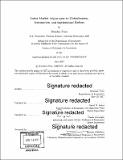| dc.contributor.advisor | David H. Autor and Daron Acemoglu. | en_US |
| dc.contributor.author | Price, Brendan | en_US |
| dc.contributor.other | Massachusetts Institute of Technology. Department of Economics. | en_US |
| dc.date.accessioned | 2017-09-15T15:30:13Z | |
| dc.date.available | 2017-09-15T15:30:13Z | |
| dc.date.copyright | 2017 | en_US |
| dc.date.issued | 2017 | en_US |
| dc.identifier.uri | http://hdl.handle.net/1721.1/111348 | |
| dc.description | Thesis: Ph. D., Massachusetts Institute of Technology, Department of Economics, 2017. | en_US |
| dc.description | Cataloged from PDF version of thesis. | en_US |
| dc.description | Includes bibliographical references. | en_US |
| dc.description.abstract | This thesis analyzes how national and local labor markets re equilibrate after shocks to labor market institutions (Chapter I), demand (II-III), and supply (IV). Chapter I analyzes Germany's 2005 Hartz IV reform, which lowered the generosity of longterm UI benefits available once short-term benefits run out. Using administrative records, I exploit cross-worker heterogeneity in the timing of when Hartz IV bites to estimate how long-term benefit cuts affect jobless durations, wages, and job characteristics. The job-finding hazard starts rising several months before cuts bind, culminating in a larger "spike at UI exhaustion" under Hartz IV. I find that UI reform reduced the probability of a one-year jobless spell by 12.4 percent, with employment gains driven by full-time jobs. Consistent with lower reservation utility, workers experiencing benefit cuts accept lower-paying jobs. Chapter II (joint with Daron Acemoglu, David Autor, David Dorn, and Gordon Hanson) argues that Chinese import competition, which surged after 2000, was a major force behind both recent reductions in US manufacturing employment and-through input-output linkages and other general equilibrium channels-weak overall job growth. Our central estimates suggest import induced job losses over 1999-2011 in the range of 2.0-2.4 million. Chapter III (joint as above) reassesses the conventional wisdom that IT is revolutionizing productivity while making workers redundant. Examining IT usage in US manufacturing, we find only mixed evidence of faster productivity growth in IT-intensive industries. Surprisingly, output in IT-intensive industries falls relative to other manufacturing industries. Productivity increases, when detectable, reflect even faster employment declines. Chapter IV exploits German high school reforms to estimate the labor market effects of sharp fluctuations in cohort size. These reforms, which eliminated grade 13 at upper-track high schools, led to an idiosyncratically timed "double cohort" in each reforming state, as students graduated under both old and new curricula. Consistent with the fact that a modest share of upper-track students enter firm-based apprenticeships after graduation, new training contracts jump by about 2 percent in double-cohort years. This increase is driven by upper-track graduates; I find no clear evidence that other graduates are crowded out, but the results are imprecise. | en_US |
| dc.description.statementofresponsibility | by Brendan Price. | en_US |
| dc.description.tableofcontents | I. The Duration and Wage Effects of Long-Term Unemployment Benefits: Evidence from Germany's Hartz IV Reform -- II. Import Competition and the Great US Employment Sag of the 2000s (joint with Daron Acemoglu, David Autor, David Dorn, and Gordon Hanson) -- III Return of the Solow Paradox? IT, Productivity, and Employment in US Manufacturing (joint with D. Acemoglu, D. Autor, D. Dorn, and G. Hanson) -- IV. Can Local Labor Markets Absorb Crowded Cohorts? Evidence from German High School Reforms. | en_US |
| dc.format.extent | 181 pages | en_US |
| dc.language.iso | eng | en_US |
| dc.publisher | Massachusetts Institute of Technology | en_US |
| dc.rights | MIT theses are protected by copyright. They may be viewed, downloaded, or printed from this source but further reproduction or distribution in any format is prohibited without written permission. | en_US |
| dc.rights.uri | http://dspace.mit.edu/handle/1721.1/7582 | en_US |
| dc.subject | Economics. | en_US |
| dc.title | Labor market adjustment to globalization, automation, and institutional reform | en_US |
| dc.type | Thesis | en_US |
| dc.description.degree | Ph. D. | en_US |
| dc.contributor.department | Massachusetts Institute of Technology. Department of Economics | |
| dc.identifier.oclc | 1003291042 | en_US |

